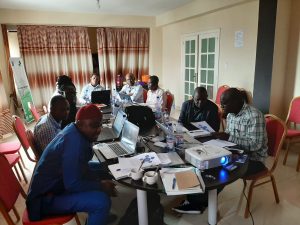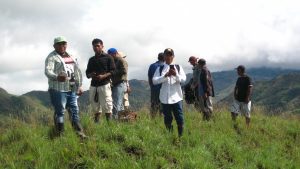Project selection process and criteria
The Tenure Facility supports projects that secure Indigenous Peoples and local communities land and forest tenure including but not limited to activities that recognise rights, legal documentation, community mapping, monitoring and conflict resolution among others, and projects that exercise community land and forest rights and forest tenure, and include activities that strengthen Indigenous and community capacity to protect, govern, plan, manage, and sustainably use their forests and lands. Country project grants will range from 1 to 3 years in duration and from US$200,000 to US$5 million in size; grants average US$1.5 M for two years. More than one grant may be made in a particular country.
The Tenure Facility welcomes letters of inquiry, but does not accept unsolicited proposals. The Tenure Facility invites project proposals, and does not issue a wide “Call for Proposals.”
The Tenure Facility aims to achieve two outcomes:
- The land and forest rights of Indigenous Peoples and local communities are made more secure by governments in targeted developing countries
- Practical approaches for implementing land and forest tenure reforms are shared and leveraged by practitioners and stakeholders to enable greater support and investment in securing the land rights of Indigenous Peoples and local communities.
Process
- Step 1: The Tenure Facility invites project ideas from eligible proponents, based on opportunities identified by the Tenure Facility’s network and its own institutional knowledge.
- Step 2: The Tenure Facility offers technical assistance to proponents to develop a complete concept note for a proposed project.
- Step 3: The Tenure Facility assesses the project concept and the proponent against the selection criteria. Proponents of concepts that meet the criteria are invited to prepare a draft proposal, to which the Tenure Facility provides feedback.
- Step 4: The proponent submits a final proposal to the Tenure Facility secretariat for appraisal. Qualified proposals are then presented to the Tenure Facility Board’s Project Selection Committee for review and consideration for approval.

Criteria
Successful grants will:
- Directly contribute to the Tenure Facility’s outcomes
- Adhere to the Tenure Facility’s principles and performance standards
- Target and respond to the needs expressed by Indigenous Peoples and local communities, providing direct benefits to vulnerable and disadvantaged groups with rapid results for improved or advanced community tenure rights
- Utilise innovative approaches or partnerships that engage Indigenous Peoples organisations, NGOs/CSOs, community associations, and/or government agencies as implementing agents to reach the target groups not reached by other programs
- Support the achievement of commitments related to REDD+, sustainable development, poverty reduction, and deforestation-free and rights-respecting business models.
- Have significant potential to achieve outcomes, add value to other efforts, and go to scale
Because some countries without significant forest cover present major opportunities to secure land rights and generate globally relevant lessons, up to 20% of the portfolio will include countries that do not have significant forest cover.
Project proponents must demonstrate:
- Legal registration in the country where project is proposed
- Community ties and accountability to members or beneficiaries
- Commitment to diversity and gender sensitivity
- Sound internal management policies and practices
- Transparent disclosure of funding sources, financial accountability and governance
- Ability to manage large grants and have the appropriate scale of operations, facilities, and equipment
- Experience in project management, coordination and financial management OR partner with another entity that will be responsible for financial management
- A project executing team with the relevant skills and experience for the proposed project
- No significant arrears in financial reporting or audits, or any cancellation of funding due to financial management issues in the past three years


